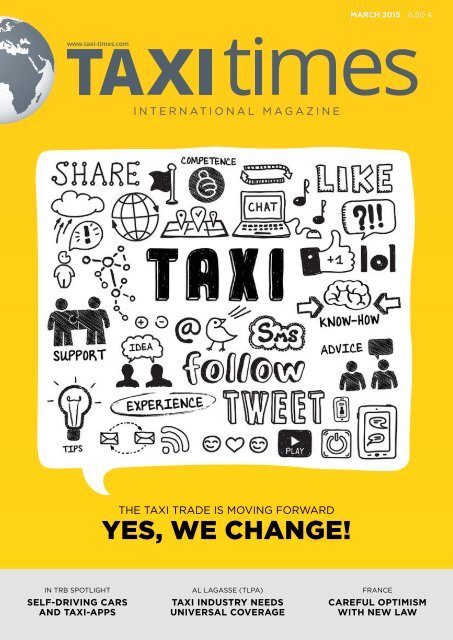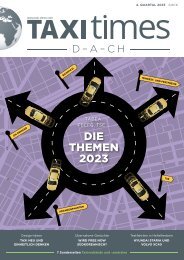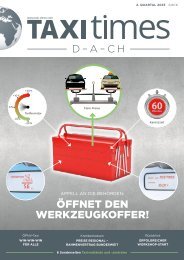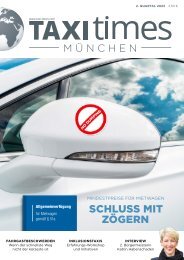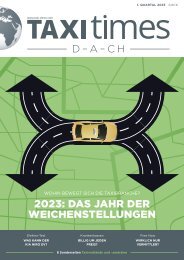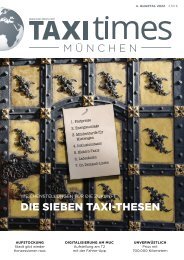You also want an ePaper? Increase the reach of your titles
YUMPU automatically turns print PDFs into web optimized ePapers that Google loves.
MARCH <strong>2015</strong> 6,80 €<br />
www.taxi-times.com<br />
INTERNATIONAL MAGAZINE<br />
THE TAXI TRADE IS MOVING FORWARD<br />
YES, WE CHANGE!<br />
IN TRB SPOTLIGHT<br />
SELF-DRIVING CARS<br />
AND TAXI-APPS<br />
AL LAGASSE (TLPA)<br />
TAXI INDUSTRY NEEDS<br />
UNIVERSAL COVERAGE<br />
FRANCE<br />
CAREFUL OPTIMISM<br />
WITH NEW LAW
CONTENT<br />
u p<br />
d<br />
t e<br />
Update<br />
yourself on<br />
different forms of<br />
'New Mobility'<br />
Details<br />
and registration on<br />
www.taxiintelligence.com<br />
Political<br />
options and<br />
choices in a<br />
new era<br />
aAmsterdam,<br />
a great destination<br />
for a two-day<br />
networking<br />
opportunity<br />
<strong>Taxi</strong>s & FHV<br />
new horizons for<br />
operations, design<br />
and technology<br />
Extensive<br />
information and<br />
discussion sessions<br />
save the dates !<br />
23-24 April <strong>2015</strong><br />
DEAR TAXI-FRIENDS,<br />
Were you a bit shocked to see this month’s cover?<br />
We initially had the same feeling when our<br />
design agency showed us their cover proposal.<br />
None of the people you see working there is a<br />
taxi operator. They are all strangers to the profession<br />
and it is their interpretation of the<br />
change the taxi sector must make. The longer<br />
you look at the drawing, the clearer it becomes<br />
how the taxi industry will have to change in the<br />
coming months and years.<br />
To deal with these themes in one go, is impossible.<br />
But the first steps are being taken, that<br />
much is clear from various articles in this <strong>Taxi</strong><br />
<strong>Times</strong> edition. Some are experimenting in the<br />
area of electro-mobility, others with the use of<br />
cashless payment systems. The entire taxi trade<br />
can profit from the outcome of these experiments<br />
and initiatives – as long as it remains connected.<br />
- the editors -<br />
DATES<br />
TAXIintell Update<br />
<strong>International</strong> <strong>Taxi</strong> & FHV Conference<br />
April 23–24, <strong>2015</strong>, Amsterdam RAI<br />
www.taxiintelligence.com<br />
TLPA<br />
Spring Conference & Expo<br />
April 29–May 2, <strong>2015</strong>, San Diego (USA)<br />
www.tlpa.org<br />
<strong>International</strong> conference Modern <strong>Taxi</strong> II<br />
May 27–29, <strong>2015</strong>, Novosibirsk, Russia<br />
msw@taxilife.ru<br />
4. Norddt. <strong>Taxi</strong>- und Mietwagentag<br />
June 6, <strong>2015</strong>, Hamburg<br />
www.taxitag.de<br />
Eurocab<br />
October 14–16, <strong>2015</strong>, Antwerp,<br />
Belgium<br />
www.eurocab.info<br />
7. <strong>Taxi</strong>treff <strong>2015</strong> (in German)<br />
Including <strong>Taxi</strong> <strong>Times</strong> workshop<br />
October 29–31, <strong>2015</strong>, Mallorca Spain<br />
www.taxitreff.de<br />
CHANGING TAXI TRADE<br />
8 At TRB, the largest transport conference:<br />
focus on apps and autonomous driving<br />
10 Al LaGasse interviewed: why the CEO<br />
of the American taxi and FHV-association<br />
TLPA is envious of Europe<br />
RADIO CIRCUITS<br />
18 <strong>Taxi</strong>.eu tests mobile payment<br />
TRADE FAIRS<br />
16 More exhibitors for Salon des <strong>Taxi</strong> in Paris<br />
17 Fresh start: <strong>Taxi</strong> World Turkey focused on<br />
national taxi market<br />
TAXI OF THE FUTURE<br />
20 Electrotaxi-special, Part 3:<br />
the first results of the Mercedes Benz B-class<br />
Electric Drive-test<br />
COMPETITION<br />
23 Betting on the battered boxer: Uber’s defeats<br />
don’t frighten its investors<br />
24 Daimler and Uber –<br />
Connected via a Carpooling-portal<br />
25 A start-up in the Big Company League.<br />
A bloated value?<br />
COMMENT<br />
6 Our comment on a taxi trade which is<br />
so much more than just apps<br />
22 Christoph M. Schwarzer:<br />
Why the first mass-produced hydrogenpowered<br />
vehicles should be used as taxis<br />
REGULAR ITEMS<br />
7, 15 News<br />
4 People<br />
26 The Final<br />
TAXI MARCH / <strong>2015</strong> 3
PEOPLE<br />
ISTANBUL<br />
TAXI GALA<br />
<strong>Taxi</strong> World Turkey, Turkey’s<br />
first taxi trade fair, was<br />
celebrated with a gala<br />
evening fit for the occasion.<br />
TAXI.EU LAUNCHES<br />
IN ISTANBUL<br />
Turkey is a proud nation, and so are its companies. As<br />
the host of the gala evening, the company “taxi.<br />
eu Istanbul” invited many exhibitors from<br />
<strong>Taxi</strong> World Turkey, officials from<br />
Istanbul associations, the company’s<br />
partners and of course representatives<br />
of the IRU and<br />
taxi.eu. Ozan Yalcinkaya,<br />
one of the company owners,<br />
gave a detailed presentation<br />
of the new cooperation<br />
between his company<br />
and taxi.eu. Ozan Yalcinkaya<br />
announced the<br />
launch of the taxi-hailing<br />
app, a founding member of<br />
the European network GTN,<br />
in Istanbul in April. In a<br />
megacity like Istanbul with a<br />
traffic density far exceeding that<br />
of many other major European cities,<br />
this hailing service is extremely<br />
useful for saving valuable time and guaranteeing<br />
secure and transparent rates for passengers.<br />
At the same time, the hailing app helps drivers<br />
to avoid empty trips and reduce fuel costs. Ozan Yalcinkaya<br />
encouraged drivers and operators of Istanbul taxi stands<br />
to use the system. <br />
jh<br />
IRU LOWERS<br />
MEMBERSHIP FEES<br />
“One of the biggest challenges that the taxi industry faces<br />
today is the globalisation of competition”, said Rezzan<br />
Dagistani, of the Istanbul office of the <strong>International</strong> Road<br />
Transport Union (IRU), during her speech at the gala evening.<br />
The taxi industry used to be a local industry subject<br />
to local market conditions and governed by local rules. It<br />
has suddenly been confronted by new, large and lavishly<br />
financed global platforms that disregard local rules and<br />
court orders. The IRU <strong>Taxi</strong> Group is facing this challenge<br />
head-on and is currently expanding to cover new members<br />
from all over the world “to make us even stronger and even<br />
more representative”, said Dagistani. The membership fees<br />
were also reformed in order to make it more attractive<br />
for taxi associations and companies to join the<br />
group. The membership fee for active taxi<br />
associations has been reduced by half<br />
to CHF 5000 (around € 4,700),<br />
while associate members pay<br />
CHF 1000 (approx. € 940). Dagistani<br />
invited taxi associations<br />
in Turkey and the<br />
Middle East to join the IRU.<br />
<br />
jh<br />
AWARD<br />
FOR<br />
ALIŞAN<br />
Turkish singer Alişan is a star in his<br />
homeland – especially among taxi drivers,<br />
who voted him the most popular singer in a poll.<br />
He was awarded a large taxi model at the gala by Ertan Ucar,<br />
chairman of a Berlin taxi association and the organiser of the<br />
evening. In return, Alişan gave a live concert during which<br />
he sang and danced among the taxi professionals. jh<br />
PHOTOS: taxi.eu Istanbul, <strong>Taxi</strong> <strong>Times</strong><br />
PHOTO: picturesborn-Nessler<br />
SPECIAL<br />
THANKS<br />
We have often chastised the taxi industry<br />
for its feeble marketing. But there are interesting<br />
exceptions. Like this example from<br />
Vienna. What do the people attending this<br />
concert by the Österreichischen Tonkünstler<br />
on January 5 have in common? They<br />
all order their cabs from radio circuit<br />
40100 and that’s why they have been invited,<br />
for the past 16 years, to the <strong>Taxi</strong> New<br />
Year’s Gala in the Grossen Musikvereinssaal<br />
in Vienna. A concert only for regular<br />
customers and friends of this Viennese<br />
radio circuit. An example of excellent – and<br />
different – marketing. <br />
jh/wf<br />
4
OUR COMMENT<br />
TAXI IN CHANGE<br />
ATHENS TAXIS SUFFER<br />
UNDER FINANCIAL CRISIS<br />
THIS TRADE IS ABOUT<br />
SO MUCH MORE THAN APPS<br />
At the moment the taxi and FHV trade is mainly fire-fighting,<br />
but it is also inspired by various successes and new initiatives.<br />
Our quick visit to the US confirmed: TNC’s<br />
(Transportation Network Companies, what<br />
we routinely call ‘apps’) dominate the<br />
mobility industry. There perhaps even<br />
more than in the taxi and private hire<br />
industry here. The various discussions at<br />
the Annual Meeting of the Transportation<br />
Research Board showed the acute demand<br />
for seminars on apps and taxis, on apps<br />
CREDIT CARDS<br />
From 8 May, <strong>2015</strong>, Berlin taxi drivers<br />
are required by law to accept credit<br />
cards. It is noteworthy that a law has<br />
to prescribe something that really in<br />
this day and age should be obvious<br />
to a service industry. While the taxi<br />
industry in some cities is still contemplating<br />
whether it should ever<br />
accept cashless payments, from the<br />
technology perspective suppliers are<br />
already making mobile payments as<br />
quick and efficient as possible. On<br />
page 18 we report on the integration<br />
of mobile payment in a taxi-app. By<br />
the way, only in Berlin.<br />
and autonomous driving and particularly<br />
on a deep gaze into the crystal ball. Where<br />
are we – as a taxi and FHV industry – going<br />
to be in one, two, five years from now?<br />
What can we, as operators and colleagues<br />
with a worldwide connection, learn from<br />
each other and develop as an approach to<br />
defend and improve our industry?<br />
Following the latest developments as<br />
we try to do at <strong>Taxi</strong> <strong>Times</strong>, sometimes a<br />
week is quite a long time. A moment of<br />
quiet reflection is not something that<br />
seems to be given to us or to the US taxi,<br />
limousine or paratransit operator – often<br />
busily fire fighting TNC’s. The same goes<br />
for the <strong>Taxi</strong>, Limousine and Paratransit<br />
Association (TLPA), where CEO Al LaGasse,<br />
in an unusually long interview, gave us his<br />
view on the state of ‘his’ industry, on the<br />
rise and development of the TNC’s and on<br />
new strategies developed and deployed by<br />
the trade. It was heartening to hear that<br />
foreign court cases involving TNC’s, examples<br />
of foreign industry initiatives and a<br />
fresh approach like GTN, really inspire colleagues<br />
in other countries.<br />
It’s also interesting to note that the<br />
same country which gave us ‘Fordism’ in<br />
the 20’s of the last century – a technique<br />
developed by car maker Henry Ford to simplify<br />
and split each job on the car-making<br />
line in the smallest and simplest possible<br />
part, just got its taxi industry refinement:<br />
‘Uberisation’: if you apply the rules of<br />
Uber, many of us will no longer have jobs<br />
or careers in the taxi industry, but will be<br />
working a few hours for Uber, a few hours<br />
for another app and so on. Never for a classic<br />
working week and never for acceptable<br />
pay. Each driver will have to piece together<br />
various app-jobs to fill enough time to<br />
make enough money.<br />
Let’s not forget there are many topics<br />
which now tend to be put on the back burner;<br />
topics which used to be at the centre of<br />
the taxi world and we are increasingly losing<br />
track of: environmentally-friendly cabs<br />
and operations, taxi as efficient, safe and<br />
reliable public transport, taxidrivers as our<br />
ears and eyes whilst we sleep. Just to mention<br />
a few things.<br />
Jürgen Hartmann<br />
EDITOR<br />
Jürgen Hartmann<br />
and Wim Faber.<br />
Wim Faber<br />
EDITOR<br />
PHOTO: Gudrun Hartmann<br />
PHOTOS: Wim Faber, Neone Nederland BV<br />
The 20.000 taxi drivers in Athens work (much) more<br />
and earn less as a result of the Greek government’s<br />
austerity measures. That’s the outcome of a study.<br />
The drop of 20% in GDP, the rise of fuel prices by 50% and extremely reduced<br />
taxi-use are worsening working conditions, making the local taxi industry<br />
suffer. That’s the outcome of a study carried out by the National Technical<br />
University of Athens.<br />
Athens taxis, with a flag fall of € 1,19, a rate of € 0,68 per km and an<br />
average cost of € 3,16 per average journey not exactly expensive, used to<br />
be an affordable way to go to work, even compared to public transport. Now<br />
locals have not only stopped<br />
using taxis, but are even cutting<br />
public transport journeys.<br />
Daily income in the taxi industry<br />
is declining steadily, with<br />
drivers spending more time<br />
waiting (on average 3–4 hours)<br />
and doing less trips than<br />
before. Nowadays not even all<br />
Athens consumers would like newer and<br />
cleaner taxi vehicles.<br />
available shifts are filled in<br />
this highly regulated sector,<br />
with its powerful unions and<br />
its own members of parliament. In many areas of the Greek capital illegal<br />
taxi ranks have popped up. Roughly ten years ago the Olympic Games led<br />
to a complete modernisation of Athens’ taxi fleet. But because of the crisis,<br />
many of these vehicles have not been replaced in the meantime.<br />
Compared to the situation before the crisis, 80% of taxi-users are taking<br />
less taxis than before, 20% completely stopped using them. 40% of these<br />
users even took a taxi a few times a week, usually to or from work. But with<br />
this reduced use, taxi-customers (and especially tourists) find taxis more<br />
readily available, the fare not too high, drivers friendlier than before but<br />
the quality of the vehicles<br />
GREEK GOVERNMENT<br />
TO TAKE TAXIS<br />
Prime minister Tsipras and his cabinet<br />
are selling off its service car fleet.<br />
Instead of driving, the politicians will<br />
ride motorcycles – or take taxis!<br />
HALE – a complete<br />
range of high quality<br />
taxi products.<br />
Be part of our success story and call<br />
+43 662 43 90 11 - 0<br />
www.hale-electronic.com<br />
merely ‘OK’. Newer and<br />
cleaner taxis are high on the<br />
wish-list of taxi-customers,<br />
just like lower fares and<br />
more accessible vehicles.<br />
Internet and app-availibility<br />
also play a part in the drop<br />
in taxi work. • wf<br />
-Connectivity<br />
Cab Tracking<br />
and Dispatching<br />
software<br />
taximeter<br />
Microtax®-06<br />
THE ORIGINAL<br />
mirror taximeter SPT-02<br />
completely integrated!<br />
NEWSTICKER<br />
TAXITRONIC NEDER-<br />
LAND RESTARTS AS<br />
NEONE NEDERLAND<br />
The introduction of the Boordcomputer<br />
<strong>Taxi</strong> (BCT), a complicated digital<br />
taxi computer in The Nether lands,<br />
has recently claimed its third victim:<br />
February 2nd, the owners of<br />
<strong>Taxi</strong>tronic Nederland BV, filed for<br />
bankruptcy. The bankruptcy included<br />
two sister companies, Neone and<br />
roof sign maker Barclays. Mid-February<br />
the company restarted as<br />
Neone Nederland BV.<br />
In the lengthy BCT-process three<br />
of the four original certified BCT<br />
suppliers have now gone bust. April<br />
last year Taxamatic, run by taxi<br />
entrepreneur Albert Haars, hit the<br />
buffers and not much later Quipment<br />
hastily made a restart. Euphoria/Cabman<br />
is the only BCT-suppler<br />
which is still standing. wf<br />
Neone Nederland’s digital taxi<br />
computer registers working times<br />
and fares.<br />
taximeter-terminal TT-01<br />
multiport thermal<br />
printer TPD-01<br />
roof sign TRS<br />
6<br />
TAXI MARCH / <strong>2015</strong><br />
7
CHANGING TAXI TRADE<br />
Dr. Mundy: “There<br />
are court cases<br />
which have 2 to 4<br />
years to go.”<br />
Mac Urata (<strong>International</strong> Transport<br />
Workers’ Federation – ITF)<br />
warned that driver safety could<br />
worsen with TNC’s.<br />
The ‘Future <strong>Taxi</strong>s’-panel covered much of the TNC/taxi discussion.<br />
AUTONOMOUS VEHICLES<br />
AND TAXI(-APPS)<br />
IN TRB-SPOTLIGHT<br />
The US has struggled with apps longer than any other country.<br />
A recent conference showed the taxi market’s uncertainty.<br />
Predictions? ‘Not the slightest.’<br />
At the world’s largest transport conference, TRB’s Annual<br />
Meeting in Washington DC (January 11–15) quite a<br />
few policymakers, administrators, practitioners,<br />
researchers, suppliers, consultants, representatives of government(s)<br />
and academia were drawn to taxi(app)- and autonomous<br />
vehicle discussions.<br />
It was standing room only in the many sessions with connected<br />
and automated vehicles. Think again, those who think the selfdriving<br />
vehicle will be here tomorrow: Google, one of its main<br />
developers, told the conference it needed at least five years of tests<br />
to iron out software problems with properly recognising events<br />
on and around the road. For instance: kids playing next to the<br />
road – are they a potential ‘danger’ to traffic or just … playing kids?<br />
Legislation in many areas is racing ahead of actual autonomous<br />
driving, although Singapore is already running tests with driverless<br />
taxis in a small industrial estate. Until last year the Vienna<br />
Convention on Road Traffic (1968) stated that a car needs to have<br />
a driver at the wheel. A little-noticed amendment to the convention<br />
now lets drivers take their hands off the wheel of driverless cars.<br />
NO APPS, BUT TNC’S<br />
So far, taxi and FHV issues have only been but a small part of<br />
TRB’s Annual Meeting, mainly as part of paratransit – transporting<br />
people with mobility handicaps. But the activities of ‘apps’,<br />
or Transportation Network Companies (TNC’s) as the US shorthand<br />
goes, have given taxi-related subjects a higher status. One<br />
three-hour (!) session (‘Future <strong>Taxi</strong>s: Implications of Transportation<br />
Network Providers for the <strong>Taxi</strong> Industry’), chaired and organised<br />
by James Cooper (University of Missouri), made a valiant<br />
effort to charter the length and breath of this burning issue.<br />
TNC’s are changing the taxi-landscape fast. Many references<br />
were made to the deregulation of the US trucking industry in the<br />
80’s. And to sudden changes in the music industry, more recently.<br />
Remember Napster? “There are different markets with different,<br />
sometimes limited rules, different pricing and brand new<br />
elements. There are now at least two different business models”,<br />
said Dr. Ray Mundy (taxi-expert of the University of Missouri).<br />
“The taxi industry will be changed and things are changing at a<br />
bewildering speed.”<br />
AIRPORTS: TAXIS AND TNC’S?<br />
“Keep in mind that this change is only a good two years old. There<br />
are court cases relating to TNC’s in the pipeline which still have<br />
two to four years to go. And then there will be appeals.” Predictions?<br />
“No, not the slightest.” Suffice to say that the app controls<br />
the driver. That creates an employer-employee relationship, whereas<br />
in the US taxi world the driver is an independent operator. Then<br />
there are insurance problems, partly because there are no data for<br />
TNC-insurance. Or not any that the TNC’s would like to share.”<br />
This is a general problem, also for regulators, this data-secrecy on<br />
the part of the TNC’s. Only recently TNC’s in Boston and New York<br />
seem willing to part with data. “And finally”, Mundy said, “airports<br />
PHOTOS: Wim Faber<br />
are watching these developments very closely as they might want<br />
to include TNC’s in their regulatory business model.” As most airports<br />
– also outside the US – regulate these activities themselves,<br />
taxis might soon have to share space with TNC’s.<br />
The two apps at the table (Curb, formerly <strong>Taxi</strong> Magic) and Lyft<br />
Technologies (not shying away from a frank discussion with regulators<br />
and taxi companies, unlike Uber), could not be more different.<br />
Both stressed urbanisation, population growth, greater<br />
city-density, a growing elderly population, environmental concerns,<br />
lower car ownership and ‘instant gratification’ by app<br />
(‘knowing that the car is on its way’) as defining reasons for new<br />
mobility approaches. Curb, as <strong>Taxi</strong> Magic one of the oldest (taxi)<br />
apps around, connects with existing regulatory structures and<br />
connects users, taxi fleets and vehicles, offers transparency, ease<br />
of payment and choice (of taxi companies). This because the taxi<br />
market is very fragmented, with no cooperation on the horizon<br />
and drivers being fiercely independent.<br />
‘WE SEEK REGULATION’<br />
On the TNC-side, offering a swift and (raised) quality service,<br />
surge-pricing remains a headache. According to Curb, the different<br />
mobility modes can only compete fully and fairly on a truly<br />
level playing field. Lyft (active in 65 US cities) connects to the<br />
ineffectual carpooling initiatives in the 70’s, with a change in<br />
technology and efficiency. It claims to do vehicle checks, background<br />
checks and to provide proper insurance. The app, now 2,5<br />
years old, says it offers many first and last mile trips to public<br />
transport (mainly in San Francisco) and opens up many areas<br />
with lower incomes. Recent developments: Lyft Line, a cheaper<br />
pooling system for one or two passengers and ‘driver destination’,<br />
offering only pick-ups on the driver’s way home. Although Lyft<br />
stressed that ‘we seek regulation’, it also sees the professional<br />
taxi training framework as ‘a barrier to entry.’<br />
The environmental side (‘Do TNC’s help the environment or<br />
just the opposite’?) was addressed by Green Tomato Cars, an environmentally-friendly<br />
sedan company started 10 years ago, now<br />
owned by the (French) Transdev-company. It stated that major<br />
changes are afoot in the areas of road infrastructure and technology:<br />
“Cities will be electric e-havens. My money is on electric<br />
driverless cars continually replenished by induction loops.”<br />
‘UBER, LYFT LOST, THE REGULATORS WON ...’<br />
The downside of apps and private cars disappearing plus flexible<br />
public transport taking over: “Uber and Lyft will immediately fill<br />
up the void by adding vehicles and contributing to congestion.”<br />
Not exactly a bonus for the environment. As universal apps now<br />
seem to be the rage in the USA, Autocab, a UK supplier of dispatching<br />
systems, stated “Yes, the taxi industry can compete!” It<br />
now unifies different and competing fleets via its universal white<br />
label app-software. Washington DC is now developing its own app<br />
in-house. And, its greatly cleaned-up fleet is now taking credit<br />
cards and should be fully wheelchair-accessible in a few years.<br />
“What’s at stake from a regulatory perpective?”, asked consultant<br />
Bruce Schaller. “Adapt the current regulatory structure<br />
and go for a level playing field or go for ‘an Uber set of rules’ with<br />
a race to the bottom where the least respected operator wins.”<br />
According to him, the expanding taxi & FHV industry<br />
(+42% between 2002–2012) is governed by an archaic regulatory<br />
structure which should combine taxi, FHV and TNC regulations<br />
in one agency.<br />
And the good news? Former New York regulator and IATRpresident<br />
Matt Daus stated that we are experiencing “a regulatory<br />
backlash. Uber, Lyft lost, the regulators won.” Within two<br />
year’s time, in one of the many lawsuits the TNC laws will be<br />
knocked out and then it’s back to the regulatory side, predicted<br />
Daus. And the spying and privacy issues Uber was fire-fighting,<br />
won’t go away either. There are court cases in that area too. These<br />
are exciting times. n<br />
wf<br />
TRB’S ANNUAL MEETING<br />
It’s the world’s largest transport conference,<br />
the Annual Meeting of the Transportation<br />
Research Board (TRB) in Washington DC<br />
(January 11–15). 12.000 specialists listened<br />
to 5.000 presentations in 750 sessions.<br />
A great ‘knowledge supermarket.’ This time<br />
taxi(apps) and autonomous driving were<br />
hot subjects.<br />
8 TAXI MARCH / <strong>2015</strong><br />
9
CHANGING TAXI TRADE<br />
CHANGING TAXI TRADE<br />
TLPA-CEO, ALFRED LAGASSE<br />
“IT TOOK THE INDUSTRY A<br />
LONG TIME TO RECOGNISE<br />
THE INTER NATIONAL<br />
THREAT OF TNC’S”<br />
Envious of foreign legal system decisiveness<br />
in taking strong action against illegal<br />
TNC’s, Al LaGasse (CEO TLPA), wishes<br />
his own court system would show more<br />
strength in following this foreign lead.<br />
Not a day passes where at least one of<br />
the apps, Transportation Network Companies<br />
(TNC’s) is the term used in the<br />
USA, makes the headlines. For the past<br />
three years, LaGasse’s long working days<br />
have been filled with the same fare, assisting<br />
members across the country in<br />
their stand against often illegal apps.<br />
TAXI TIMES: It all started in<br />
San Francisco …<br />
AL LAGASSE: “Although Uber started<br />
five years ago in San Francisco, it stayed<br />
under the radar for quite a while. It’s interesting<br />
to note that one app – <strong>Taxi</strong>Magic,<br />
now Curb – was earlier on the market than<br />
Uber, but this app connects taxi-users<br />
with licensed taxi companies.”<br />
What were the major changes in these<br />
three years?<br />
“Recently, Uber, Lyft and Sidecar have<br />
grown into significant national players.<br />
Before that they were only active in a few<br />
markets like San Francisco and Seattle. In<br />
mid-2013 Uber started branching out to<br />
»Uber is an<br />
extremely<br />
aggressive firm<br />
that will not accept<br />
statements of<br />
opposition<br />
of anyone except<br />
courts.«<br />
Washington DC, Boston and Chicago with<br />
their UberBlack service at first. Soon thereafter,<br />
they introduced UberX (UberPop) and<br />
then quickly grew from there. We sounded<br />
the alarm nationally and internationally,<br />
but many members,<br />
especially those in<br />
smaller jurisdictions,<br />
thought TNC’s would be limited<br />
to the largest cities and would never<br />
affect them. Now even relatively small cities<br />
are affected. Do you know Portsmouth,<br />
New Hampshire? No? There’s a TNC there.<br />
It has only 22.000 inhabitants.”<br />
“It took the industry a long time to see<br />
the national and international development.<br />
Our first job was to get recognition<br />
for the fact that this is a true industrywide<br />
problem. We hadn’t really achieved<br />
that before April 2014, when Lyft suddenly<br />
opened in 24 US cities in one week<br />
and UberX followed suit. The race for TNC<br />
market dominance and the driver labour<br />
force was on.”<br />
INSURANCE<br />
PHOTO: Wim Faber<br />
The taxi sector was the first to feel the<br />
effects. In many areas where TNC’s have<br />
been active for over a year, the taxi industry<br />
has felt a drop in income of approximately<br />
40%. Of the widely quoted figure of<br />
a 65% drop in San Francisco, LaGasse says<br />
this is “blown out of all proportions” and<br />
“based on a limited sample.” Yet in the taxi<br />
to the TLPA my driver told me half the<br />
500+ taxi fleet at his company was parked<br />
and not used. “The taxi companies were<br />
the first to respond”, says LaGasse. “The<br />
limousine industry is just now responding.<br />
At the time paratransit operators were<br />
dealing with other problems: aggregators<br />
(brokers) who entered their business as<br />
middle men between government and service<br />
providers. They are the least affected<br />
by the TNC’s thus far, although Uber said<br />
it would provide a wheelchair-accessible<br />
service in San Francisco. A pure PR-move,<br />
if you ask me. So far they have done a mis-<br />
era-<br />
ble job<br />
of servicing<br />
people with<br />
mobility handicaps.<br />
But time will tell.”<br />
“Yes, TNC’s have made significant<br />
inroads in the taxi business. Generally<br />
their prices are 20–40 per cent lower.<br />
Except when they are surge pricing, and<br />
that happens far more often than you<br />
think. Because of weather, blocked roads,<br />
high demand, whatever. There’s always a<br />
reason. Several times a day TNC’s will be<br />
much more expensive than taxis. Uber<br />
provides a taxi service, but doesn’t call it<br />
a taxi service, thinks it doesn’t have to<br />
follow the rules required for taxis, benefits<br />
from doing that and doesn’t incur the costs<br />
licensed taxi companies are compelled to<br />
meet.”<br />
‘The more consensus you build within the industry, the better.’<br />
One of the main ‘savings’ is insurance.<br />
Most TNC’s claim to have proper<br />
insurance. A claim hotly disputed<br />
by the taxi industry.<br />
“It’s insurance with major gaps. So many<br />
gaps that 28 states have already issued<br />
warnings for TNC-insurance. It’s not ‘first<br />
dollar’ insurance and it means you have<br />
to go through the driver’s insurance first.<br />
When that is denied, you can seek coverage<br />
from Uber. That has evolved into better<br />
insurance since they started, mainly<br />
under pressure from the public sector. We<br />
had a professional expert go through all<br />
166 pages of Uber’s policy and addendums.<br />
There are gaps there. But keep in<br />
mind that when a customer signs up with<br />
Uber’s terms and conditions for instance,<br />
he waives the right to sue Uber. The same<br />
goes for the drivers: they also waive their<br />
rights.”<br />
But TNC’s happily claim they are covered<br />
to the tune of a million dollars.<br />
“That’s what Uber says. How real is that<br />
sum? They string each lawsuit out to make<br />
sure payments don’t have to be made. That<br />
helps keep their cash flow healthy. In the<br />
early days money was tight. There was no<br />
money to pay insurance. Now they would<br />
10 TAXI MARCH / <strong>2015</strong><br />
11
CHANGING TAXI TRADE<br />
CHANGING TAXI TRADE<br />
like to save on that, even though they had<br />
to act to get better insurance when forced<br />
by public policy. They could easily have<br />
commercial car insurance on each vehicle<br />
in their system, but then they would lose<br />
their most significant cost advantage over<br />
licensed taxis.”<br />
Why is Uber making such an issue of<br />
buying the right insurance?<br />
“Insurance is a critically important cost factor.<br />
Our industry is required to buy primary<br />
commercial insurance. Each licensed<br />
taxi driver, limo driver, UberBlack or Uber-<br />
SUV-driver and in New York each livery<br />
driver carries primary commercial insurance<br />
that covers the vehicle 24 hours a day,<br />
365 days a year. Our insurance is primary<br />
and commercial and our auto liability<br />
insurance will pay injured parties and will<br />
meet the state’s financial standards for<br />
insurance. Uber spent tremendous sums<br />
on lobbyists to make sure they would not<br />
have to buy the same type and level of<br />
insurance. They may have spent more on<br />
the lobbyists than on the actual insurance.<br />
In the long term they are hoping to save<br />
money. They’ve made a judgement and they<br />
think it’s worthwhile. That’s the major reason<br />
why they can charge less.”<br />
Who pays up if the TNC’s insurance<br />
doesn’t pay?<br />
“There’s a high probability that many TNCclaims<br />
are paid out of the private insurance.<br />
Because drivers don’t tell their insurance<br />
company they’re driving for a TNC. The<br />
states where this is happening, are burdening<br />
their citizens with higher insurance<br />
premiums, because they are subsidising<br />
Uber-claims. The insurance companies are<br />
hoping to keep licensed commercial fleets<br />
and create a new TNC-policy.”<br />
WHAT’S HAPPENING?<br />
You said you warned the international<br />
industry. Was nobody listening?<br />
»It’s insurance with<br />
gaps. So many<br />
gaps that 28 states<br />
have already issued<br />
warnings for<br />
TNC-insurance.«<br />
“We have many very intelligent members<br />
all over the world, but when these illegal<br />
operations first popped up their reaction<br />
was like ours: ‘It won’t stand.’ The same<br />
reaction as in the US market. ‘Regulations<br />
are made for a reason.’ Especially when<br />
they have to do with public safety. It is hard<br />
to believe that when you have significant<br />
investment capital, it allows you to provide<br />
the same service as we do, but without<br />
meeting the same public safety standards.<br />
There are rules about insurance, vehicle<br />
inspections and driver background checks.<br />
Violating these rules means you cut costs.<br />
And from a public safety point of view, cutting<br />
corners is bad. There are many locations<br />
where this happens. It gives lots of<br />
advantages to the operator: it’s cheaper and<br />
you hit the road faster with your product.”<br />
Were regulators not concerned?<br />
“It is fair to say that with rare exceptions<br />
regulators are not sympathetic to TNC’s at<br />
all. Regulators understand the nuances of<br />
the industry and public safety. Politicians<br />
don’t understand the industry, they don’t<br />
deal with it. They are intrigued by the<br />
TNC’s marketing, by what they call ridesharing.<br />
The ‘sharing economy’ sounds<br />
good – let’s give it a try. But why have we<br />
had public safety requirements for the past<br />
100 years?”<br />
“Politicians lean on regulators. There’s<br />
no question that a regulators’ instinct is to<br />
enforce public safety. They don’t stop until<br />
they’re told to stop. We are disappointed at<br />
the lack of regulatory crackdown. Once you<br />
meet with the regulator you understand<br />
it’s not the regulator but the politicians<br />
pulling the strings. Some regulators feel<br />
passionately about this. It will come back<br />
to haunt the politicians. In Boston recently,<br />
there were three sexual assaults within a<br />
month.”<br />
Haven’t things changed? Uber has had<br />
some pretty bad months.<br />
“Yes, there is a definite backlash against<br />
TNC’s. But we need to differentiate. Uber<br />
is the leader. In the US, in most of the<br />
world. Uber is most aggressive at violating<br />
existing rules pushing past the regulator<br />
and going for a political response. Uber is<br />
an extremely aggressive firm that will not<br />
accept statements of opposition of anyone<br />
except courts. They will huff and they will<br />
puff, but they will back down after court<br />
action. The others in the US are very similar<br />
but not as bold. But that may be a<br />
financing issue. Uber’s got the money.”<br />
What caused this backlash?<br />
“It was mainly a PR-backlash. December<br />
2014 was collectively the worst month for<br />
TNC’s. Several different things: Uber’s<br />
arrogant statements over the checking of<br />
reporter-backgrounds and numerous high<br />
profile sexual assaults – a polite way of<br />
saying rapes – worldwide. Attacking the<br />
media was a very bad idea. Before, the<br />
media were not looking – shame on them!<br />
Now they are more willing to listen to the<br />
stories of others. As Uber grew, there were<br />
more problems. Are they perhaps violating<br />
the law?”<br />
Did Europe play a clear role?<br />
“Yes, what also helped was that several<br />
European nations took legal action. The<br />
media took a stronger look and found flaws.<br />
There is a lot the media can report on. Particularly<br />
if things are not as Uber portrays<br />
them. What happens now? Uber’s had two<br />
PHOTO: Wim Faber<br />
bad months and they’re rebounding. They<br />
invited journalists to cocktails, beefed up<br />
staff with seasoned professionals who<br />
could help them find a way out of this. My<br />
message: obey the law as the TNCs do in<br />
New York. Fingerprint drivers, let the public<br />
authorities inspect your vehicles, and<br />
pay the same taxes and fees as other operators.<br />
They can operate within the law in<br />
New York. So why can’t they follow the law<br />
in all other cities? The new people they’re<br />
bringing into Uber should convince the<br />
CEO and others that obeying the law is not<br />
such a bad idea.”<br />
Were you envious of those European<br />
countries?<br />
“Yes, I was envious of the rest of the world.<br />
It made me disappointed in our own politicians<br />
and judicial process. Uber has the<br />
right to change the law, to work within the<br />
rules. But to operate with the thinly veiled<br />
excuse that ‘we are different, the rules<br />
don’t apply to us.’ We take heart that other<br />
countries respect their laws and apply<br />
them. We hope that our politicians learn<br />
from that.”<br />
“It’s also a slippery slope. Uber urged<br />
drivers to provide unlicensed taxi service<br />
for several years and now, in the few communities<br />
where they have convince the<br />
politicians to make UberX legal, Uber now<br />
tells those same drivers that they cannot<br />
pick up on the street. Uber doesn’t want<br />
them to pick up off-app on the street,<br />
because Uber won’t get its 20% fee. Isn’t it<br />
surprising that drivers will still create<br />
ranks? And try to get work on the streets<br />
illegally – without the app? Here the TNCs<br />
have created a problem for themselves and<br />
it will not easily be remedied.”<br />
Are there Uber-ranks?<br />
“Absolutely! Uber drivers sit outside the<br />
major restaurants and entertainment centres<br />
in Washington DC. ‘Do you want a<br />
ride, sir?’ It’s a standard practice with<br />
many UberX drivers. Difficult to stamp out.<br />
ALFRED LAGASSE<br />
Al LaGasse, (60) CEO of the <strong>Taxi</strong>cab Limousine & Paratransit Association<br />
(TLPA) in Rockville, Maryland (USA), joined the organisation in 1978 with<br />
a degree in Business Administration from the George Mason University.<br />
LaGasse is probably the longest serving CEO of any taxi association. His<br />
political and management skills and in-depth knowledge of the US industry<br />
made TLPA the leading authority in the US taxi, limousine and paratransit<br />
sector and him the long-time favourite of TLPA’s membership.<br />
Uber is also limiting their liability. Uber<br />
admits that when you’re not going through<br />
the app you’re not insured in any way.”<br />
What would you recommend operators<br />
do?<br />
“It’s difficult but very important to objectively<br />
examine your own services. Make<br />
sure you deliver the service the public<br />
needs. Look at your own technology. Major<br />
firms all have apps of which the quality is<br />
good. The message about enforcing the law<br />
hasn’t worked well in the US. Now our message<br />
is mainly a public safety message. You<br />
also need position papers that explain our<br />
industry in simple and direct terms. The<br />
media doesn’t understand the industry and<br />
the issues. Neither do politicians.”<br />
“The more consensus you build within<br />
the industry, the better. In every city they<br />
go into the TNC’s have a plan. We are not<br />
one company. Every city has different<br />
requirements. We don’t have a cookie<br />
cutter response to their cookie cutter<br />
12 TAXI MARCH / <strong>2015</strong><br />
13
CHANGING TAXI TRADE<br />
NEWS<br />
BRUSSELS<br />
GOVERNMENT<br />
FINANCES<br />
DIGITAL<br />
TAXIMETERS<br />
As Brussels<br />
cabs are no<br />
‘pirate taxis’<br />
they will<br />
have a digital<br />
meter.<br />
By October 2016 all taxis in the Brussels Capital Region should be fitted with<br />
the most advanced taxi meter. The Region will spend € 3,2 million.<br />
approach. We need to<br />
educate the industry<br />
operators to spread<br />
the same strong public<br />
safety message.”<br />
Isn’t it a very uneven<br />
battle financially?<br />
“We are dogged in<br />
our determination.<br />
Unflinching, unfailing<br />
we have to be there<br />
365 days of every year. IRU and national<br />
associations all have to be there. What happened<br />
to Uber in December was three years<br />
in the making. Two bad months in 2014.<br />
But they are in for more. TLPA staff is growing<br />
by one to 6, but the number of our consultants<br />
has grown tremendously: legal,<br />
legislative, social media, insurance and PR.<br />
It’s been a burden that our members share.<br />
This year we have to double our fees as there<br />
are significant costs we need to share.”<br />
Can the industry learn a lesson from<br />
TNC’s?<br />
“We rely too much on our colour schemes,<br />
the visibility of our cabs. That’s not enough<br />
anymore. People have shown they prefer<br />
not to call a dispatcher. They prefer pushing<br />
a button on their smartphone. People<br />
like that, I like that. Technology gives comfort<br />
if it’s done right. Showing the vehicle<br />
coming towards you on your smartphone<br />
screen gives confidence in the service. A<br />
great idea. Another one is rating drivers.<br />
This may encourage some drivers to provide<br />
more customer friendly service.”<br />
»We need universal<br />
coverage. It’s a<br />
worthwhile goal to<br />
strive for as soon<br />
as possible.«<br />
“Marketing perhaps? Yes, they give away<br />
free trips. That’s what you have to do when<br />
you’re in business providing an illegal service.<br />
Or spend major dollars on social<br />
media. It’s too costly for licensed operators<br />
to provide free trips. But if you’re not paying<br />
licensing fees and expenses, it’s not so<br />
difficult to give away free trips.”<br />
LaGasse is honest about the state of the<br />
industry: “Are they hurting us? Yes! In the<br />
early days we fought them off quite well.<br />
Most operators in the US have more than<br />
one type of operation – the lines between<br />
services are more blurred here. In the US<br />
we’re probably headed to a relaxation of<br />
many licensing and<br />
public safety requirements<br />
in the taxi<br />
industry. I firmly<br />
believe TNC’s public<br />
safety requirements<br />
must be and will be<br />
tightened and like us<br />
they must turn over<br />
data to regulators.<br />
We could do with<br />
paying less fees to<br />
the cities, if we want a chance to lower<br />
our rates and compete with TNC prices.<br />
And if the rules are relaxed for our competitors,<br />
then for us as well. We need to<br />
have a look at new business practices, like<br />
surge pricing. Not to copy it and charge 7<br />
or 8 times the fare, but to give our drivers<br />
who are out in bad weather, a reasonable<br />
incentive to stay on the road for the<br />
passengers.”<br />
One universal app for the US, would<br />
that work?<br />
“That’s a universal ideal that can be realised.<br />
But we never got our members<br />
behind one methodology for an app. I say,<br />
lets start going through the steps, if we<br />
ever want to get there. The market is not<br />
big enough to support a 100 apps in the<br />
USA and more than a 100 worldwide. How<br />
many will survive? My guess is fewer than<br />
5 taxi apps in the US, and maybe 10 worldwide.<br />
We need universal coverage. It’s a<br />
worthwhile goal to strive for as soon as<br />
possible. That’s why we think GTN is such<br />
a good initiative.” n<br />
wf<br />
PHOTO: Wim Faber<br />
PHOTO: Weilandt, Faber<br />
All 1.270 taxis in the Brussels region must<br />
be fitted with new digital meters, similar<br />
to the digital taximeters in Flanders and<br />
the advanced on-board computers (BCT) in<br />
The Netherlands. But where Dutch taxi<br />
operators received a subsidy of a mere<br />
€ 600 on an average BCT of € 1.300 to<br />
€ 1.500, Brussels colleagues will profit<br />
from a generous local government. Minister<br />
Pascal Smet (Mobility) will finance the<br />
meters from a budget of € 3,2 million. So<br />
far only 40 of the taxis in the European<br />
Dirk Ritter, responsible for the traffic business supervision of the<br />
Authority for Economy, Transport and Innovation of the City of<br />
Hamburg, drew a positive balance. The so-called fiscal taximeters<br />
were installed and supported financially in 2.104 taxis, says Ritter.<br />
This is a “huge number<br />
which we can all be proud of”.<br />
It is a very strong signal when<br />
“2/3 of all vehicles voluntarily participate,<br />
guaranteeing fair competitive<br />
conditions and im proving<br />
their image significantly”.<br />
Unlike most other areas, taxi<br />
permits in Hamburg are not limited<br />
and they increased drastically<br />
in the beginning of the new<br />
millennium – from 3,391 in 1966<br />
to over 4,000 in 2000. Consequently,<br />
a parallel economy and<br />
moonlighting were emerging.<br />
capital are fitted with a digital meter. How<br />
the Region is going to decide on the supplier<br />
of these meters, is not yet decided.<br />
With the new taximeter drivers will no<br />
longer have to record their rest and driving<br />
times with pen and paper, local government<br />
gets more data and customers get<br />
more information about price and distance.<br />
Smet insists on maximum transparency in<br />
the taxi sector. The neww meters must enable<br />
card and smartphone payments. The<br />
meter should not only simplify the work of<br />
FINAL BALANCE IN HAMBURG<br />
The number of <strong>Taxi</strong>s in Hamburg is falling continuously.<br />
the taxi driver. As its data will be stored<br />
on an “external server” and in the meter<br />
itself, local government will also get a<br />
wealth of information about the local taxi<br />
activities and about local traffic.<br />
For Smet this is a first step “in making<br />
the Brussels taxi sector more dynamic and<br />
customer friendly. At the moment I’m<br />
working on a <strong>Taxi</strong> Plan, which I will present<br />
to the government in due course. With<br />
this plan we are moving towards a better<br />
taxi service in Brussels.” <br />
wf<br />
On the 30th of November 2014 ended a project of several years, promoted by the licensing<br />
authorities of Hamburg, for the installation of fiscal taximeters.<br />
In order to monitor actual sales again, the Hanseatic city started<br />
a project known as the “Hamburg Model”. The voluntary installation<br />
of tamper-proof taximeters was financially supported.<br />
Through the participation of numerous companies, as well as the<br />
evaluation of recorded sales, realistic<br />
values could be determined<br />
again, serving as a starting point<br />
for the authorities.<br />
As a result, the extension of<br />
concessions was refused to many<br />
companies, as their specific sales<br />
were classified as implausible.<br />
“The time the taxi business in<br />
Hamburg was finding itself rather<br />
in a ‘grey zone’ is finally over” Dirk<br />
Ritter concluded. “The number of<br />
taxis in Hamburg is falling continuously.<br />
Today, there are only 3,252<br />
taxis on Hamburg’s roads.” jh<br />
14 TAXI MARCH / <strong>2015</strong><br />
15
TRADE FAIRS<br />
TRADE FAIRS<br />
Most taxi drivers<br />
at the Salon were<br />
positive about<br />
the new taxi-law.<br />
“taxi.eu Istanbul”<br />
was one of 28<br />
exhibitors of “<strong>Taxi</strong><br />
World Turkey”<br />
One seminar dealt with the taxis’ role in … 1914.<br />
Unusual suppliers next to the<br />
classic ‘taxi brands’.<br />
SALON DES TAXIS: <br />
CAREFUL OPTIMISM<br />
WITH NEW LAW<br />
The jury is still out on the new law on taxis and<br />
VTC, but the atmosphere at the bi-annual<br />
Paris taxi exhibition (31/01–01/02) was upbeat.<br />
TURKEY’S<br />
TRADE FAIR<br />
GETS OFF TO A<br />
GOOD START<br />
No surprise that most conference<br />
seminars centred on the new law<br />
on taxis and VTC (private hire)<br />
and had standing room only. One topic was<br />
typically French: one seminar paid its<br />
respects to the heroic efforts by the Paris<br />
taxi drivers in WW1 to get as many soldiers<br />
to the Marne-front near Paris as possible.<br />
The Renault taxis (one was shown at<br />
the Salon) from taxi company G3 transported<br />
5.000 soldiers in two days. (The<br />
seminars – in French – can be found on:<br />
www.salondestaxis.com).<br />
RISING INTEREST<br />
With over 5.000 visitors in two days the<br />
Salon is the main exhibition in France. Created<br />
in 1998 and organised by Marc Szperling,<br />
the <strong>2015</strong> edition – the 12th – is the<br />
largest so far: 1.000m2 more than in 2013.<br />
“This underlines the rising interest of the<br />
companies supplying the taxi industry”,<br />
Szperling told our colleagues of 100%<strong>Taxi</strong>.<br />
“Even though taxi drivers (the main audience<br />
of the Salon) are wondering about<br />
their future, there has been a clear increase<br />
in numbers from Salon to Salon. I am sure<br />
the taxi sector, which is very visible in<br />
France, will adapt to the new demands customers<br />
make on it.”<br />
»Any app must use<br />
licensed taxior<br />
VTC-drivers.<br />
You can no longer<br />
have apps using<br />
private drivers.«<br />
Almost half the stand space was taken up<br />
by the largest Paris radio circuit and its<br />
affiliates: Group G7. This company not only<br />
dispatches cabs, but also sells and lets vehicles<br />
(with and without licences) and other<br />
taxi equipment, and provides driver training.<br />
“We welcome the new law, which was<br />
voted almost on the last day of 2014, but it<br />
will now depend on how well the authorities<br />
put a stop to all illegal app-activities”,<br />
says G7 CEO Serge Metz. “The good thing<br />
is that any app must use licensed taxi- or<br />
VTC-drivers. You can no longer have apps<br />
using private drivers and their vehicles.”<br />
VERY NATIONAL MARKET<br />
What doesn’t benefit the industry in<br />
France is the large number of industry<br />
associations and unions: about ten (!) were<br />
represented at the Salon’s entrance, but<br />
they were taking up much less space than<br />
the vehicle suppliers. Skoda, VW, Opel,<br />
Renault, Citroen and Mercedes were most<br />
noticeable, next to unusual taxi brands like<br />
Infiniti and Suzuki. Apart from the leading<br />
rooflight- and meter-suppliers in the now<br />
open French market (ATA, Kienzle and<br />
Hale), many independent and mostly<br />
French suppliers had focused on taxi apps,<br />
with ‘offwigo’ as one of the most interesting<br />
startups. In that respect France<br />
remains a very special and independent,<br />
but also very national market. n wf<br />
PHOTOS: Wim Faber<br />
PHOTOS: <strong>Taxi</strong> <strong>Times</strong><br />
Turkey’s first taxi trade fair took<br />
place this year. Nearly 30 exhibitors<br />
presented their products at<br />
‘<strong>Taxi</strong> World Turkey’ In Istanbul.<br />
With celebratory words, Yahya Uğur, the Istanbul taxi<br />
association president, cut the red ribbon and inaugurated<br />
the first taxi trade fair in Turkey. Associations,<br />
drivers’ unions, many service providers and vendors of taxi-related<br />
products were present. Vehicle manufacturers did not participate,<br />
although there would have been enough space in the Istanbul trade<br />
fair hall, which was two thirds full.<br />
New taxi regulations will soon come into effect in Istanbul and<br />
other Turkish cities, which is why the exhibitors focused on the<br />
needs of the domestic market. Digitisation is also underway in<br />
the Turkish taxi industry. Numerous app providers such as Takside,<br />
IQ-<strong>Taxi</strong>, Bitaksi (the Turkish version of mytaxi) and taxi.eu<br />
provide the sector, an additional and much more efficient alternative<br />
to the usual neighbourhood taxis stands. And so the model<br />
of a historical ‘Istanbul T 48’ taxi presented by Bitaksi took on a<br />
symbolic meaning: While the Turkish taxi market is still very<br />
traditional, the future is poised to emerge from the background<br />
in the form of smartphone apps. • jh<br />
Yahya Uğur (middle), president of the Istanbul <strong>Taxi</strong><br />
Association, visits Hermann Waldner (second from the<br />
left), whose app taxi.eu will be coming to Istanbul.<br />
TAXIMETER<br />
BOOM<br />
There are 17,000 taxis<br />
in Istanbul. It was no<br />
surprise that so many<br />
taximeter manufacturers<br />
were presenting<br />
their products. In<br />
addition to the Turkish<br />
leaders Alberen<br />
and Taksim as well as newcomer ATA, there<br />
were several well-known European manufacturers<br />
such as Digitax, <strong>Taxi</strong>tronic and<br />
Semitron. The Greek manufacturer presented<br />
a new LP 50 thermal printer that is linked to<br />
the taximeter by cable or Bluetooth. jh<br />
16 TAXI MARCH / <strong>2015</strong><br />
17
RADIO-CIRCUITS<br />
RADIO-CIRCUITS<br />
TAXI.EU NOW ACCEPTS<br />
MOBILE PAYMENT<br />
With a pilot test in Berlin, the app ‘taxi.eu’ will facilitate quick, cashless<br />
payment via smartphone. PayPal is an important partner.<br />
Berlin taxis draw<br />
attention to the mobile<br />
payment option with<br />
eye-catching outdoor<br />
advertising.<br />
Especially because this mobile payment solution is a unique selling<br />
point for taxi.eu in comparison to its competitors: The noncash<br />
payment can be made even if the customer gets into the taxi at<br />
the taxi stop without placing an order via the app first. “In this<br />
case, all the driver has to do is request an activation code on his/<br />
her terminal,” taxi.eu’s staff Stephan Müller explains the process.<br />
“The taxi user has to enter this code in his/her smartphone and<br />
authorise payment.”<br />
By also integrating PayPal, taxi.eu was able to agree on a comprehensive<br />
marketing campaign with PayPal for the start of the<br />
pilot test. PayPal will advertise the new service at Berlin traffic<br />
hubs such as train stations and the airport. And approximately<br />
900 taxis in Berlin have been driving around with PayPal-advertising<br />
on their doors.<br />
Coincidentally, the mobile payment option starts at an opportune<br />
time in Berlin. Berlin was the first city in Germany where<br />
taxis were officially ordered by the competent regulatory authority<br />
to accept at least three common credit cards. After May 8, taxis<br />
with drivers who do not accept credit card payment are prohibited<br />
from driving passengers. “Most of our taxis accepted credit<br />
cards before and processed them with appropriate devices,” Hermann<br />
Waldner insists. “The fact that nowadays we are able to<br />
accept an additional and very simple payment process with taxi.<br />
eu-Payment is a clear proof of our high potential in comparison<br />
to competitors like Uber, mytaxi and others.” n<br />
jh<br />
FROM BERLIN<br />
TO EUROPE<br />
5,700 taxis drive for the radio circuit<br />
Berlin TZB in the German capital.<br />
An estimated one fifth will test taxi.<br />
eu-Payment in accordance with<br />
TZB’s decision-makers. In<br />
order to participate, both<br />
the driver and the vehicle<br />
need to be registered.<br />
As usual with <strong>Taxi</strong><br />
Berlin, participation is<br />
on a voluntary basis.<br />
Should the pilot test<br />
prove successful,<br />
other radio circuits<br />
connected to the<br />
taxi-eu dispatch<br />
service will<br />
also be able to<br />
integrate this<br />
function.<br />
taxi.eu Payment runs on<br />
the PDA- and DBG<br />
touch-devices and also in<br />
the driver-app menu.<br />
Simply show the translation<br />
The <strong>Taxi</strong> Language Phrasebook<br />
Charm offensive – in over 70 languages!<br />
● 21 essential phrases every taxi driver needs.<br />
»A clear proof of<br />
the taxi trade’s<br />
high potential.«<br />
Hermann Waldner<br />
Recently, taxi users in Berlin have been able to pay for their<br />
taxi ride via credit or cash card, no additional terminal<br />
required. The payment is processed via the taxi.eu app.<br />
The company FMS / austrosoft programmed the necessary interface<br />
whose system is used to dispatch all kinds of taxi orders to<br />
the vehicles of central fleets. Now the payment<br />
option “PayPal” has been integrated<br />
for the first time. In the next few weeks,<br />
the new app (taxi.eu Payment) will be tested<br />
for suitability in daily use in the approx.<br />
5,700 taxis of the Berlin radio circuit TZB.<br />
The transaction process is authorised<br />
via the customer’s smartphone exclusively.<br />
For this purpose, the taxi user must<br />
register and authorise his/her credit card in advance and/or<br />
have a PayPal account. The driver processes the payment via<br />
the order terminal or via the driver app. That means that at the<br />
end of the trip, the driver activates the M(obile)Payment mode<br />
and enters the price. The price is shown on the customer’s smartphone<br />
who confirms it. Then the driver confirms the payment,<br />
which is thus finalised. The Berlin radio circuit TZB is responsible<br />
for settlement.<br />
Hermann Waldner, TZB managing director and also co-founder<br />
of the taxi.eu app, closes the gap to the competing apps with<br />
this additional payment option. mytaxi, an<br />
app transmitting trips directly to the smartphones<br />
of registered taxi drivers and operators,<br />
had introduced a simil arly simple<br />
mobile payment system in 2013. <strong>Taxi</strong><br />
Deutschland, a competitor in par ti cular on<br />
the German market, has been offering a<br />
mobile payment option since 2014.<br />
Time and again, taxi.eu received minus<br />
points due to the lack of this payment option in various comparison<br />
tests between national and international taxi apps.<br />
Recently, the app lost by a close vote to mytaxi in a ranking of<br />
the German consumer portal ‘Vergleich.org’. For the future, they<br />
are hoping for better ratings and a leap to first place.<br />
PHOTOS: TZB<br />
● Be able to communicate in 74 languages.<br />
● Simply point and let the passenger<br />
read, they need only to nod or shake<br />
their head.<br />
WELCOME,<br />
WILLKOMMEN,<br />
BIENVENUE!<br />
Welcoming <strong>International</strong><br />
Guests to your Cab.<br />
The <strong>Taxi</strong> Driver‘s Phrasebook.<br />
Order now from the taxi-<strong>Times</strong>-<br />
Verlag publishing house Munich<br />
www.taxi-times.com<br />
Phone: 089/215 48 30 75<br />
Autorin Gabi Kröber,<br />
Der <strong>Taxi</strong>-Sprachführer,<br />
18<br />
by Gabriele Kröber<br />
TAXI MARCH / <strong>2015</strong> 179 Seiten, Ringbuchbindung, 19<br />
ISBN 978-3-955008-02-7<br />
19.80 €<br />
(inclusive of VAT<br />
+ 3,90 € shipping<br />
charges)
FUTURE TAXI<br />
FUTURE TAXI<br />
History on the<br />
inside, the future<br />
on the outside:<br />
the first Stuttgart<br />
e-taxis at a photo<br />
shoot in front of<br />
the Mercedes-Benz<br />
Museum.<br />
Project partner Dekra checks the condition of<br />
the tyres and the wear and tear on parts.<br />
ELECTRIC TAXIS, PART 3<br />
Fast and frugal: The Plug-In C-class drives up to 250<br />
km/h and consumes only 2.1 litres.<br />
PLUGGING IN THE STAR<br />
MERCEDES C-CLASS<br />
HYBRID MODEL<br />
Will electric taxis take over in the future? If so, when will it happen<br />
and which models will be used? These series report on the latest<br />
developments in electric taxis and their initial use in shift operations.<br />
Four Mercedes-Benz B-class models<br />
and one Vito, all with electric<br />
motors, have been operating in<br />
Stuttgart since August as part of the<br />
‘GuEST’ project. This is remarkable in<br />
itself given that the European version of<br />
the B-class electric drive has only recently<br />
become available on the German market<br />
and is still to come to other countries.<br />
As such, the four Stuttgart electric taxis<br />
were obtained from manufacturing sources<br />
in the U.S., where series production<br />
has been underway since April.<br />
In terms of the objectives of the current<br />
project in Stuttgart, this discrepancy is not<br />
of major significance. The key is to develop<br />
a sustainable operational model for electric<br />
taxis. During the entire test phase, technical<br />
issues will be examined and evaluated,<br />
as well as acceptance factors and willingness<br />
to use. Two scientific institutes (Zirius<br />
and FKFS), the companies Bosch and<br />
Dekra, and the Stuttgart radio circuit ‘TAZ’<br />
are taking part in the state-funded project.<br />
The economic aspects are of course also<br />
being examined. Is it truly profitable to<br />
operate an e-taxi? There are three main<br />
factors that determine profitability: charging<br />
time, reach, and acquisition and operating<br />
costs. Companies and their drivers<br />
claim that they can cover around 120–150<br />
kilometres before recharging is needed.<br />
Just as with traditional combustion<br />
engines, consumption is strongly correlated<br />
with individual driving style and the<br />
additional energy used for heating, air<br />
condition and other features. ‘The average<br />
reach goes down noticeably in winter”,<br />
reports Raffael Pfeil of FKFS.<br />
For this reason, some of the drivers in<br />
the project have had to turn down longer<br />
journeys. “I was not pleased by this at all”,<br />
says taxi driver Marcelo Schellenberg. On<br />
the day of our interview, he already had an<br />
outbound journey. The battery was still full<br />
in the morning so there was enough power,<br />
but afterwards he had to drive to a charging<br />
station. In fact, he had to drive to three of<br />
them because the first two were occupied.<br />
After about an hour, the battery was<br />
sufficiently charged for him to end his<br />
shift. A double shift with the B-class electric<br />
drive would not be practicable. In fact,<br />
the city gave the field test participants special<br />
permission for dual use, allowing<br />
them to use their license in another taxi<br />
during charging.<br />
This protects them from losing revenue<br />
but diminishes profitability, since the<br />
costs for two taxis are incurred. It would<br />
nevertheless be wrong to base the feasibility<br />
of e-taxis solely on the reach factor.<br />
The participating taxi operations have<br />
accepted this drawback (which is also why<br />
Bosch employee Ian Faye has called them<br />
“the true heroes of the project”) so that<br />
many other factors can be researched and<br />
evaluated. How high is the acceptance by<br />
the general public (“unanimously positive”),<br />
and what conclusions can be drawn<br />
from the combination of tracking and performance<br />
data of the battery (which are<br />
transferred directly from the FMS communication<br />
system via an interface)? Are<br />
there significant discrepancies in material<br />
wear (to be investigated by Dekra)?<br />
“Integrative thinking is required in<br />
order to evaluate electromobility” concludes<br />
Dr Rüdiger Goldschmidt from Zirius,<br />
referring to the complexity of all the factors<br />
that need to be taken into consideration.<br />
This is also why so many project partners<br />
from different sectors are involved,<br />
including associated partners such as<br />
Daimler as a the supplier of the e-taxis,<br />
EnBW as the electricity provider, and the<br />
city of Stuttgart. The latter sees taxis as<br />
the pioneers in the transition to electromobility.<br />
Financial support will be provided<br />
for the acquisition of 100 e-taxis in<br />
PHOTO: GuEST<br />
PHOTOS: Dekra, <strong>Taxi</strong> <strong>Times</strong><br />
Passengers can answer questions on<br />
electromobility via a touch display.<br />
2016. If the correct conclusions are drawn<br />
from the results of the GuEST project and<br />
the appropriate political decisions are<br />
made, this would be another opportunity<br />
for the taxi trade to project a modern and<br />
adaptable image. •<br />
jh<br />
Like a true racer, Mercedes has launched a C-class C 350 e on<br />
the market. The vehicle has a 279 HP petrol plug-in hybrid engine<br />
under the hood. It combines a petrol engine with an electric<br />
motor and a high-voltage lithium-ion battery with a capacity of<br />
6.38 kWh that can be charged with an external power source.<br />
Recharge time lasts from 1.5 to 2 hours. The two-litre, four-cylinder<br />
turbo combustion engine delivers 211 HP and 350 Nm while<br />
the e-motor provides an additional 60 kW and 340 Nm for a combined<br />
system performance of 279 HP and 600 Nm. The vehicle<br />
incorporates a seven-speed automatic gearbox as standard. The<br />
saloon accelerates from 0 to 100 km/h in 5.9 seconds; the T-Model<br />
does it in 6.2 seconds. The saloon reaches a maximum speed of<br />
250 km/h, the T-Model up to 246 km/h. Standard consumption<br />
for both is specified at 2.1 litres per 100 kilometres. • jh<br />
20
GUEST COMMENTARY<br />
COMPETITION<br />
Future-look: the first mass-produces hydrogen-powered vehicle “Mirai”<br />
CHRISTOPH M. SCHWARZER<br />
… works and lives in Hamburg as<br />
a freelance journalist. He is a<br />
specialist in the energy transition<br />
in the automotive industry.<br />
»Highly paid<br />
lobbyists<br />
work for<br />
Uber – in<br />
Washington<br />
alone one<br />
hundred«<br />
ELECTRIC<br />
UNLIMITED<br />
INVESTORS BET ON<br />
<br />
THE BATTERED BOXER<br />
A Japanese automaker has introduced the first mass-produced<br />
hydrogen-powered vehicle. Our guest commentator proposes that<br />
the first models be used right away as taxis.<br />
From Madrid to Rio, from Seoul to Portland. Widespread<br />
bans on Uber have pervaded the past few weeks. Investors are<br />
not impressed – quite the contrary.<br />
Mirai is Japanese for ‘future’. This is the name Toyota gave<br />
its hydrogen-powered fuel cell vehicle. Company president<br />
Akio Toyoda personally handed over the first car<br />
to Prime Minister Shinzo Abe in January. The U.S. and Europe are<br />
following the domestic market; initially only a few hundred cars<br />
will be produced annually. It would be disastrous if this innovative<br />
marvel of mobility were only to be experienced by influential<br />
people in high positions. The ideal way for the general public to<br />
get to know the Mirai would be to put it use as a taxi.<br />
Fuel cell vehicles are the ultimate electric cars. Rather than<br />
patiently charging an overweight and outsized battery with electricity<br />
for hours, the Mirai generates it on board. Electric power<br />
from hydrogen and the surrounding air is used to fuel the 113<br />
kW (154 HP) engine. The tanks are filled in three minutes. Then<br />
the car can drive over 500 kilometres, taking drivers and passengers<br />
silently and comfortably through the streets.<br />
It is purely speculative, but it would make sense for Toyota to<br />
provide some of the newly manufactured Mirais for use as taxis<br />
throughout Los Angeles, California, or Hamburg, Germany, or<br />
London, UK. The Japanese have understood that, in order to sell<br />
the cars in a given country, the infrastructure must be in place.<br />
It would work without hydrogen filling stations. These are often<br />
sponsored and constructed by state institutions. For example, the<br />
NEDO (New Energy and Industrial Technology Development<br />
Organization) in Japan and the National Organisation Hydrogen<br />
and Fuel Cell Technology (NOW) in Germany have done so successfully.<br />
The advantages of the technology are obvious. Fuel cell-powered<br />
electric vehicles have no limitations and are therefore superior<br />
to battery-powered vehicles. <strong>Taxi</strong> drivers would not have to calculate<br />
whether they can complete a requested route. The feeling of<br />
being tied to a cable is now in the past. So is having to calculate<br />
reduced ranges in winter. Fuel cell cars are completely flexible<br />
and practical.<br />
Toyota intends to convince customers with yet another benefit<br />
for which the Prius model is known a million times over: reliability.<br />
Many of the Mirai’s parts are identical to those of the Prius.<br />
In simple terms, the combustion engine has been replaced by the<br />
fuel cell stack and the gasoline by the pressurised gas tank. The<br />
aim of this is to keep the costs affordable, since the manufacturer<br />
cannot yet achieve economies of scale while the vehicle is still<br />
being produced in small quantities. The price varies regionally,<br />
ranging from US$50,000 to €78,000.<br />
Whether the hydrogen-powered fuel cell car Mirai can assert<br />
itself in the competition against battery-powered cars remains to<br />
be seen. What is clear is that it would be suitable for everyday<br />
taxi use as the perfect combination of permanent availability and<br />
low cost. The chances are good that this will happen. It is also<br />
clear that competing vehicle technologies tend to reinvigorate<br />
business. And this is urgently needed in a local market that has<br />
often been overly stagnant. The Mercedes diesel engine models,<br />
the hybrid engine Toyota and the electric battery-powered Nissan<br />
will soon be competing against a fourth concept: the fuel cell car.<br />
May the best car win. •<br />
cms<br />
PHOTOS: Toyota, Schwarzer<br />
ILLUSTRATION: Löffler<br />
With its service UberPOP, Uber<br />
seems to be in a boxing<br />
match and taking a massive<br />
pounding at every round. A ban here, an<br />
indictment there, a data scandal here, a<br />
rape there. Uber is getting the count on<br />
every round, and it’s working its way up<br />
to ten. Even so, the bets on the company<br />
increase every time the gong is struck.<br />
Investment companies are putting more<br />
money behind Uber. The company now has<br />
a value of $40 billion (see the comparison<br />
on page 25).<br />
Filthy rich, but illegal. The American<br />
company is being shown its limits, especially<br />
with its UberPOP service. Governments<br />
and courts in more and more<br />
countries are pronouncing unequivocal<br />
bans. UberPOP has been illegal in Rio de<br />
Janeiro since December; in Europe, the service<br />
was banned in the Netherlands and<br />
Spain, and as of the new year in France. In<br />
Asia, Uber has been banned in India, South<br />
Korea and Thailand. China followed suit at<br />
the beginning of January. The Ministry of<br />
Transportation banned several ride-sharing<br />
apps used to contact private drivers without<br />
taxi licences.<br />
Even in Uber’s country of origin, the group<br />
and its domestic competitor Lyft have each<br />
had to retreat. Operations were banned by<br />
the State of Nevada on 26 November, and<br />
operations were suspended in Portland,<br />
Oregon on 21 December.<br />
In many other regions, the Uber management<br />
was not deterred. With the help<br />
of billions of dollars from investment bankers<br />
who continue to support the company<br />
in spite of negative headlines (in India, for<br />
example, an Uber driver was reported to<br />
have raped a woman), Travis Kalanick and<br />
his employees pay the fines that are due<br />
or hire expensive lawyers to appeal such<br />
decisions in court. Highly paid lobbyists<br />
also work for Uber. In Washington alone<br />
there are said to be 100 lobbyists who are<br />
in close contact with local politicians.<br />
But even these measures fail in many<br />
places. In Germany, the objection by an<br />
administrative court in Hamburg to the<br />
UberPOP ban was dismissed by the highest<br />
court authority back in November. In order<br />
to keep the service afloat, Uber is now<br />
offering rides at dumping prices below<br />
vehicle costs in Hamburg, Berlin and Düsseldorf,<br />
which is legal under German law.<br />
The drivers are said to receive payments<br />
to make up for the low fares.<br />
In Spain, the court pronounced a ban at<br />
the beginning of December, yet Uber continued<br />
to offer UberPOP. Spain’s Supreme<br />
Court pulled the plug on 27 December. The<br />
telecommunications services and credit<br />
card service providers were then ordered<br />
not to provide service to Uber ‘effective<br />
immediately’. The company was thereby<br />
deprived of the technical foundation of its<br />
business idea. A few days later, Spain’s<br />
Uber manager Carles Lloret announced the<br />
discontinuation of the UberPOP service.<br />
This brings us to another boxing match<br />
analogy: brought down by a technical<br />
knockout. The investors will not be pleased<br />
at how this ends. n<br />
jh<br />
DID YOU KNOW …<br />
<strong>Taxi</strong> <strong>Times</strong> reports twice a week<br />
in its newsletter on all the<br />
Uber developments and many<br />
other current events from the taxi<br />
industry. Register now at<br />
www.taxi-times.com.newsletter.<br />
22 TAXI MARCH / <strong>2015</strong><br />
23
COMPETITION<br />
COMPETITION<br />
Will the top management of<br />
Mercedes gradually lose its focus<br />
on the taxi industry?<br />
UBER AND<br />
MERCEDES<br />
IN THE<br />
SAME BOAT<br />
The recently announced alliance between an expanding ride sharing<br />
app and the ridesharing service Uber puts a long-standing partnership<br />
between Mercedes and the taxi industry at risk.<br />
KIND OF<br />
BLOATED<br />
What began as a small start-up<br />
now has a company value of over<br />
$40 billion (just under €36 billion).<br />
Uber is moving into an arena<br />
occupied by large companies that<br />
have taken decades to grow.<br />
40<br />
milliarden<br />
$<br />
“OUR MEMBERS ARE<br />
VERY UPSET”<br />
<strong>Taxi</strong> associations and companies in<br />
other countries have also expressed<br />
indignation over the cooperation<br />
with Uber. The activities with regard<br />
to my<strong>Taxi</strong> and Blacklane had already<br />
caused a certain degree of unrest.<br />
A taxi company in Belgium – traditionally<br />
Mercedes users – initially<br />
decided to cancel an order of 40 new<br />
Mercedes taxis. The Belgian taxi association<br />
GTL sent a letter of complaint<br />
to Mercedes-Benz Belgium, urgently<br />
demanding an explanation. “We don’t<br />
want to make things worse”, said<br />
Pierre Steenberghen, general secretary<br />
of GTL, “but we want to send a<br />
clear message that our members are<br />
very upset about the cooperation<br />
between the ‘taxi brand’ and Uber.”<br />
The taxi association KNV <strong>Taxi</strong> in the<br />
Netherlands also asked the national<br />
Mercedes subsidiary for clarification<br />
on the cooperation with Uber. Daimler’s<br />
comment was that “we intend to<br />
redefine intelligent, intermodal mobility<br />
with the mobility platform Moovel<br />
and show customers how to get from<br />
A to B. (…) Our goal is to work in<br />
close partnership with the taxi industry<br />
in order to exploit together the<br />
potential of the mobile Internet.” wf<br />
The integration of Uber is a first<br />
step towards offering complete<br />
door-to-door mobility for medium<br />
and long distance routes.” The statement<br />
by Carpooling CEO Markus Barnikel<br />
explains the cooperation between his<br />
platform ‘mitfahrgelegenheit.de’ (international<br />
‘carpooling.com’) and Uber.<br />
The app captures the concept behind<br />
the sharing economy: someone with a<br />
car takes someone else without a car<br />
along on his medium to long distance<br />
journey and receives compensation for<br />
the transportation costs. Mit fahr gelegenheit.de<br />
serves as a platform for both<br />
parties to connect. Use of the platform<br />
was initially free when it launched<br />
around ten years ago. That changed<br />
when Mercedes joined the company in<br />
2012. Shortly afterwards, a commission<br />
system was established. The ridesharing<br />
portal then also began taking in a<br />
share of the costs.<br />
Carpooling expanded to North America<br />
in 2014, where it worked on establishing<br />
its platform in close cooperation<br />
with Uber. This cooperation is now also<br />
being pursued in Germany with<br />
reversed roles. Now Carpooling is helping<br />
the U.S. company with its European<br />
network, a move that was received with<br />
outrage from the taxi industry.<br />
The indirect connection between the<br />
illegal activities of the ridesharing company<br />
with its UberPOP service and Mercedes-Benz<br />
was quickly recognised in<br />
the U.S. Daimler invested around €8<br />
million in Carpooling in 2012 and holds<br />
around 17 per cent of the company’s<br />
shares.<br />
“Anyone who is cooperating with<br />
Uber is working against our industry”,<br />
says Ertan Ucar, chairman of the association<br />
<strong>Taxi</strong> Deutschland, Berlin, criticising<br />
the Daimler group. “As carmakers,<br />
Daimler should side with the drivers of<br />
its saloons instead of forming an unholy<br />
alliance against the taxi industry”,<br />
says Hermann Waldner, who unites<br />
around 130 radio circuits with over<br />
65,000 drivers throughout Europe with<br />
the taxi.eu app.<br />
The discontent regarding the role of<br />
Mercedes is also making things difficult<br />
for the federal association BZP (German<br />
taxi and private hire association). Several<br />
member headquarters and state<br />
associations are demanding a clear position<br />
from the BZP against Mercedes –<br />
and some of them would like the group<br />
to lose its supporting membership. Others<br />
doubt whether such threatening gestures<br />
could convince a global company<br />
to change its strategy. “The annual support<br />
BZP receives from Mercedes is<br />
nearly 3 per cent of the amount that was<br />
initially invested in Carpooling in<br />
2012”, says one industry insider. This<br />
shows just where the vehicle manufacturer<br />
has set its priorities. • jh<br />
PHOTO: <strong>Taxi</strong> <strong>Times</strong><br />
PHOTOS: DHL, <strong>Taxi</strong> <strong>Times</strong>, Unicredit, Delta-Airlines<br />
MERCEDES-BENZ / DAIMLER AG<br />
UNILEVER<br />
DEUTSCHE POST AG<br />
Automotive group, currently transitioning<br />
to comprehensive mobility solutions<br />
Market value: €72.2 billion<br />
Employees: approx. 280,000<br />
Among the top five biggest food<br />
manufacturers<br />
Total assets in 2013: €45.5 billion<br />
Employees 2013: 174,000<br />
Shipping and logistics group<br />
Market value: € 31.8 million<br />
Employees in 2013: approx. 440,000<br />
DELTA AIRLINES<br />
Among the top three airline<br />
companies<br />
Market value: €31.4 billion<br />
Employees: approx. 80,000<br />
»According to Uber’s business<br />
model, the intermediary takes<br />
a fifth of the fare. In order to live<br />
up to its rating, Uber would<br />
have to do more than just take<br />
over the global taxi market.«<br />
Quote from Handelsblatt, published on 5 December 2014,<br />
Last update: January <strong>2015</strong>, sources: Handelsblatt, Wikipedia<br />
UNICREDIT<br />
Banking consortium<br />
Market value: €33 billion<br />
Employees: approx. 130,000<br />
Data as in January <strong>2015</strong>. Sources: Handelsblatt, Wikipedia.<br />
24 TAXI MARCH / <strong>2015</strong><br />
25
THE FINAL<br />
SUBSCRIPTION<br />
The ‘3 <strong>Taxi</strong> Guys’: from the left Rick Hewatt,<br />
John Lazar and Jamie Campolongo.<br />
THE CHECKER CAB<br />
THAT BECAME A BBQ<br />
The Checker ‘CabaCue’ cooks whole hogs.<br />
‘The CabaCue’, that’s the proud name of<br />
the classic 1979 Checker Marathon which<br />
drove around Atlanta and then sat in a junk<br />
yard for 20 years. It was recently given a<br />
completely new lease of life as a … barbecue<br />
and smoker.<br />
Strange? Not if you’re the ‘3 <strong>Taxi</strong> Guys’.<br />
A few years ago Rick Hewatt (Atlanta<br />
Checker Cab), Jamie Campolongo (Pittsburgh<br />
Yellow Cab) and John Lazar (Luxor<br />
Cab in San Francisco), found each other in<br />
their love of barbecuing.<br />
They went one step further and started<br />
up ‘3 <strong>Taxi</strong> Guys’, creating and supplying<br />
delicious barbecue sauces and rubs. “We<br />
also have a professional BBQ competition<br />
team”, adds Rick Hewatt. “And we now use<br />
the CabaCue to cook whole hogs in BBQ<br />
competitions all over the US. We have competed<br />
in The World Championship BBQ<br />
Cooking Contest in Memphis and in the<br />
Big Pig Jig here in Georgia, which is one of<br />
the largest and most challenging BBQ contests<br />
in the world! Obviously we are having<br />
a lot of fun with it as we compete in about<br />
7 or 8 BBQ contests a year and have won<br />
many accolades and first place ribbons for<br />
our BBQ sauces and cooking.”<br />
And the CabaCue? Hewatt laughs: “There<br />
was a reality show on the Food Network<br />
called ‘The Shed’ here in the US about a BBQ<br />
restaurant and the owners, the Orrison Family,<br />
in Ocean Springs Mississippi. One of the<br />
episodes is called ‘Smokin <strong>Taxi</strong>’, featuring<br />
the owner Brad and myself building this taxi<br />
smoker. It also featured the ‘3 <strong>Taxi</strong> Guys’<br />
taking delivery of the unit at a BBQ and<br />
Blues event here in Atlanta where we cooked<br />
on the CabaCue for the crowd. Pretty cool!”<br />
“My repair shop here in Atlanta completely<br />
restored the car and together we<br />
put the CabaCue in ‘3 <strong>Taxi</strong> Guys’ colours.<br />
Don’t forget to mention our web site<br />
www.3taxiguys.com where anyone can<br />
order our delicious products. Our saying<br />
is: “It’s Cabilicious.”<br />
wf<br />
ONE MILLION<br />
REWARD FOR<br />
AN UBER-TRIP<br />
The Seoul authorities want to make absolutely<br />
sure its ban of the Uber-app is followed<br />
to the letter and hopes to engage the<br />
help of the population. Everyone who<br />
reports an Uber-trip and proves it with a<br />
receipt, photo or video, receives a 1 million<br />
Won reward – about 800 Euro. In the Korean<br />
capital dispatching trips via the Uberapp<br />
has been banned since July 2014. jh<br />
Curious<br />
Cabbies!<br />
PUBLICATION INFORMATION<br />
Publisher<br />
taxi-times Verlags GmbH<br />
Frankfurter Ring 193a<br />
80807 Munich, Germany<br />
Tel: +49 (0) 89 – 14 83 87 91<br />
Fax: + 49 (0) 89 – 14 83 87 89<br />
E-Mail: info@taxi-times.com<br />
Web: www.taxi-times.com<br />
Managing Director: Jürgen Hartmann<br />
Bank details<br />
Stadtsparkasse München<br />
BLZ 70150000, Account number 1003173828<br />
IBAN: DE89701500001003173828<br />
BIC: SSKMDEMM<br />
UST-ID: DE293535109<br />
Handelsregister: Amtsgericht München<br />
HRB 209524<br />
Desk<br />
Telefon: +49 (0) 89 – 14 83 87 91<br />
Fax: + 49 (0) 89 – 14 83 87 89<br />
E-Mail: redaktion@taxi-times.com<br />
Editor in Chief<br />
Jürgen Hartmann, j.hartmann@taxi-times.com<br />
Managing Editor (<strong>International</strong>)<br />
Wim Faber, w.faber@taxi-times.com<br />
Contributors to this issue<br />
Christoph M. Schwarzer<br />
Translation Probicon<br />
Layout<br />
Kornelia Jaeger, Iris Lutterjohann,<br />
Henrike Uthe, Lotte Rosa Buchholz &<br />
Juliana Hesse (responsible)<br />
Raufeld Medien GmbH<br />
Paul-Lincke-Ufer 42/43, 10999 Berlin<br />
Tel: +49 (0) 30 695 665 - 89<br />
Sales Management<br />
Elke Gersdorf, e.gersdorf@taxi-times.com<br />
Tel: +49 (0) 89 – 14 83 87 92<br />
Fax: +49 (0) 89 – 14 83 87 89<br />
Printing<br />
Chroma Druckerei<br />
Imwalidow 9, 68 200 Zarky, Poland<br />
<strong>Taxi</strong>-<strong>Times</strong> is published 6 times a year<br />
Price 6,80 €<br />
ISSN-Nr.: 2199-4048<br />
Website: www.taxi-times.com/en<br />
PHOTOS: Faber, Bank of Korea<br />
Fancy <strong>Taxi</strong> <strong>Times</strong>?<br />
Launch offer!<br />
Subscribe to the<br />
print issue of <strong>Taxi</strong> <strong>Times</strong><br />
now and secure all<br />
editions <strong>2015</strong> for free!<br />
News<br />
update<br />
Simply scan QR code and<br />
order free copies!<br />
Or contact us:<br />
Mail: abo@taxi-times.com<br />
Phone.: +49 89 215 48 30 75<br />
Free<br />
trial!<br />
Know what is happening<br />
in the taxi world<br />
The newsletter with international taxi topics<br />
· This always keeps you up to date<br />
· Every two working days the latest updates<br />
from the taxi world<br />
· In <strong>English</strong> and German<br />
Register now for free below ...<br />
www.taxi-times.com/en/newsletter<br />
26<br />
taxi-times Verlags GmbH<br />
new: Frankfurter Ring 193a<br />
D-80807 Munich<br />
Tel.:<br />
Fax:<br />
Mail:<br />
+49 89 215 48 30 70<br />
+49 89 215 48 30 79<br />
info@taxi-times.com
ON THE ROAD FOR YOU<br />
THE TAXI-APP FOR EUROPE<br />
Partner of the european taxi dispatch centres<br />
A connecting network<br />
Be a part of a network of the largest taxi dispatch centres in Europe.<br />
More than 70 european cities in 9 countries are partners of taxi.eu and take<br />
part of the automatic arrangement of taxi rides.<br />
Be innovative! Be a part of it!<br />
We and our partners in Berlin, Vienna, Hamburg, Munich, Zurich,<br />
Amsterdam, Rotterdam, Prague, Copenhagen, Luxembourg, Brussels, Basel,<br />
Lausanne, Hanover, Geneva, Frankfurt, Graz, Lyon, Stuttgart, Salzburg and<br />
many others, counting on you.<br />
download<br />
now<br />
for free<br />
We would like to inform you about the possibilities of the cooperation with<br />
taxi.eu.


